Who has never dreamed of touching the stars? Are you one of those people for whom astronomy is a way of life? Without being able to travel in space and rub shoulders with the stars, our guide to the best astronomical binoculars will allow you to unlock its secrets and who knows, one day to be able to get there.
One of the easiest ways to project yourself into the vastness of space without ever leaving Earth is to admire the night sky with astronomical binoculars. Comfortably seated in a lounge chair on a clear, dark night and accompanied by your cup of tea or hot chocolate, it would be foolish to miss the evening because of a pair of binoculars not suited to the practice of astronomy . The universe is waiting for you then stop and your binoculars!

In order to benefit from the best experience during your night out to conquer the stars, you must make sure that your binoculars are well designed for astronomy. For this, we offer you the ultimate guide to a successful outing.
Astronomy binoculars or telescope?
Above all, it is worth asking the following question before buying astronomy binoculars. Do you need binoculars dedicated to astronomy or buy a telescope?
The telescopes are big. Even the smallest models are larger, heavier and longer than most astronomical binoculars. Telescopes should therefore be placed on tripods to ensure their stability.
The inclination of a long tube towards the sky exacerbates the tremor problem. Holding it by your hands makes the objective lens move while binoculars can be locked more easily at eye level. This ensures more stability when searching for constellations or stars.
Telescopes make objects appear larger. This is a problem when observing targets in the deep sky like comets, galaxies and very diffuse star clusters. With the exception of observing the moon and some living planets.
Telescopes only show a small viewing area. Astronomy binoculars, with their wider field of view, allow you to scan the sky in search of stars. They also give you a much better idea of how the objects relate to each other, ideal for observing the constellations.
You will understand that a pair of astronomy binoculars has many advantages compared to a telescope. So what is the best pair of binoculars for astonomy?
How to choose your astronomical binoculars
After considering the reasons why you should choose binoculars rather than a telescope, it is time to think about the important criteria that should not be overlooked when selecting astronomical binoculars. Here are some basic things to consider when choosing a pair of binoculars:
Check binocular specifications
Understanding the technical specifics of binoculars can help you decide which are best suited to your specific needs. We invite you to read our article on the important criteria to take into account when purchasing binoculars.
What magnification and objective?
You may have noticed that there are many different configurations on the market. Some observers prefer a high magnification in order to be able to observe the thousands of luminous points in the sky. It also help to pinpoint with precision the structures composing the galaxies.
Others opt for immersive observation with a large field to have a more global vision of the sky, thus preferring portability to the power of the objective.
The only real advice I can give you is to buy binoculars that you are most likely to take with you on your travels, whether you go down the street or on the other side of the planet.
This implies a smaller and lighter format, which tends to have a lower magnification. If it is your only pair, I suggest a lens not exceeding 50 mm and a magnification of 10x maximum.
What about smaller astronomical binoculars? This can do the trick as long as they have high quality optical glasses. You can for example opt for 8 × 35 binoculars which also allow bird watching thanks to a wider field of vision than most low power binoculars offer. Thi is generally a plus for observing the sky.
Opt for waterproof astronomical binoculars
We live on the Blue Planet and water can appear in several states. Sometimes it condenses in your binoculars. Sometimes it rains. And sometimes we drop them overboard. Thus, it is wise to use waterproof binoculars to avoid all the inconvenience related to the weather.
Many modern binoculars are coated with rubber to effectively protect against water and shock. But the cheapest binoculars may not be treated against water. Air loaded with water vapor can be sealed in the binoculars and cause rust inside your device. So look for those that have been purged with nitrogen.
Do I need a tripod?
You found the Andromeda Galaxy with your astronomy binoculars. Want to observe it without seeing the stars turn into lightning? Do you also want to show it to your partner? It would then be useful to be able to lock a position in the sky. To do this, you need to make sure that your binoculars have a screw mounting point for attaching a stand such as a tripod.
Best Binoculars For Astronomy: Our Top 3 Picks
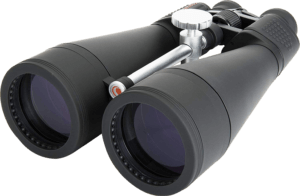
Magnification : 20x
Objective diameter : 80 mm
Field of view : 3.7 °
Minimum focusing distance : 33 m
Prismatic material : BaK4
Eye relief : 18 mm
Water resistance : yes
Compatible with a tripod : yes
Weight : 2.13 kg
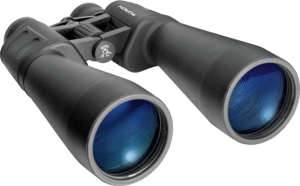
Magnification : 15x
Objective diameter : 70 mm
Field of view : 4.4 °
Minimum focusing distance : 9 m
Prismatic material : BaK4
Eye relief : 18 mm
Water resistance : yes
Compatible with a tripod : yes
Weight : 1.41 kg
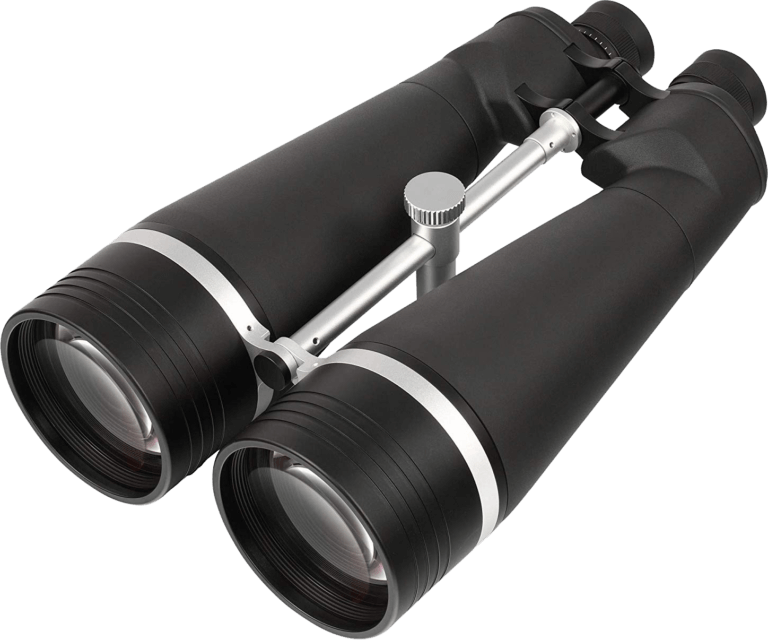
Magnification : 25x
Objective diameter : 100 mm
Field of view : 2.5 °
Minimum focusing distance : 25 m
Prismatic material : BaK4
Eye relief : 18 mm
Water resistance : yes
Compatible with a tripod : yes
Weight : 3.35 kg
Celestron SkyMaster 20 × 80
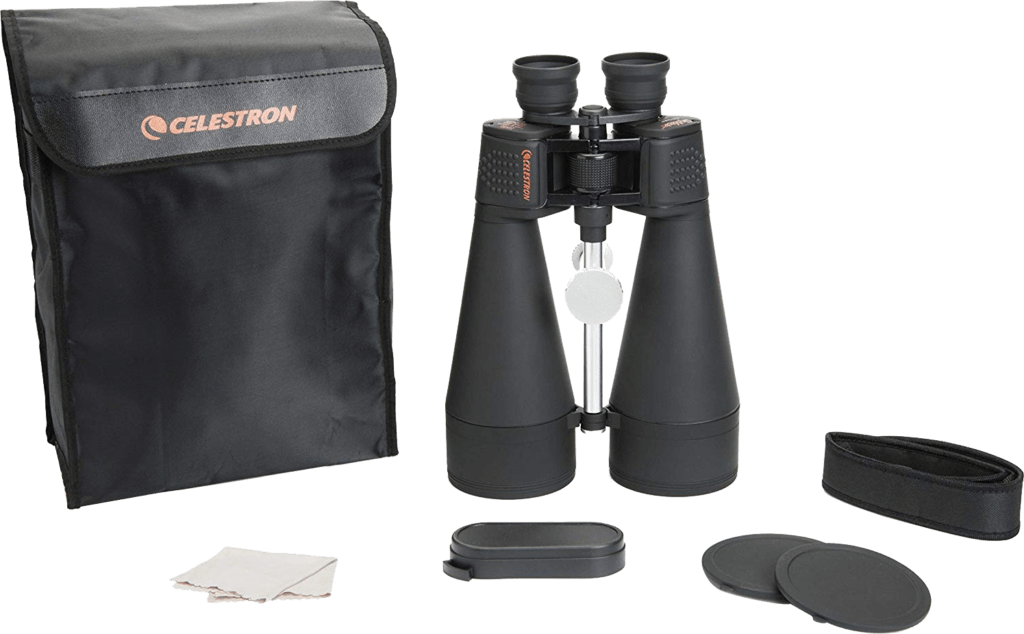
Do you want to have a pair of quality astronomical binoculars without breaking your piggy bank? Then the Celestron SkyMaster 20 × 80 model is a good choice.
With 20x magnification, these binoculars guarantee 20 times better vision compared to vision with the naked eye. Thanks to its Porro prism binoculars, it will be easy and pleasant to observe the stars at all times.
The Celestron SkyMasters have a wider field of vision to guarantee you better vision during nocturnal observations of the universe. This is the reason why it offers an 80 mm diameter lens. This diameter therefore makes it possible to capture more light and therefore to have brighter images.
Most importantly, the 80mm diameter makes this pair of astronomical binoculars perfect for dimly lit environments such as in astronomy. In addition to this, this model benefits from a fully multi-layer optic which provides clear and sharp images.
The large central focus wheel is very easy to use. Its manipulation will allow you to easily adjust the images as you search for stars and planets.
Its firm grip is also accompanied by a protective rubber cover which helps cushion falls in the event of an accident.
If you also intend to use these astronomical binoculars for a terrestrial observation, the Celestron SkyMaster binoculars will adapt perfectly to this mission. These binoculars are known for their performance in extreme conditions and their reliability is no longer to be proven.
Orion Astronomical binoculars 15 × 70
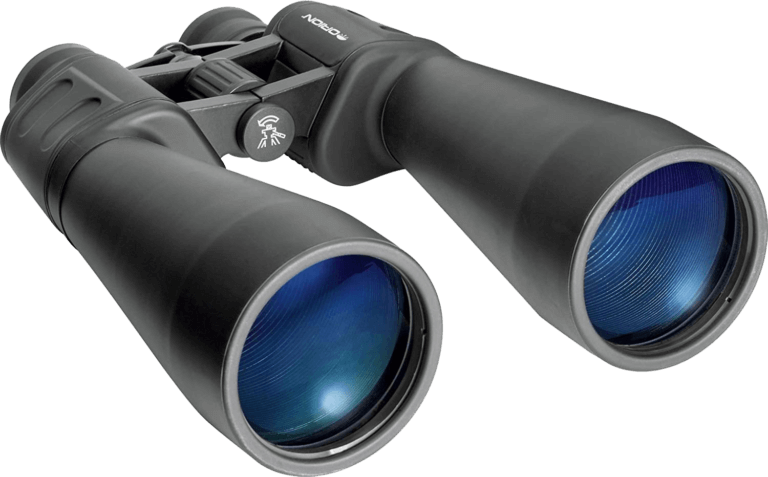
The Orion 15 × 70 astronomical binoculars are a good choice for stargazing. This pair of binoculars captures a lot of light and therefore produces brighter images.
With these binoculars, you can easily observe Venus, Jupiter, Saturn and even Mars. These are 15x magnification astronomical binoculars with a beautiful field of view of 4.4 degrees. Coupled with a robust high-end case, this pair of binoculars is worth every euro that you will invest in it.
It is also completely waterproof thanks to a nitrogen treatment. Durable in construction to prevent fogging of the lens in foggy weather, the Orion 17 × 70 is ideal for use in a rainy environment or in a dimly lit area.
This pair of binoculars also comes with an adapter that fits with any tripod and will stabilize your device for a long period of astral observation.
Omegon Nightstar 25 × 100
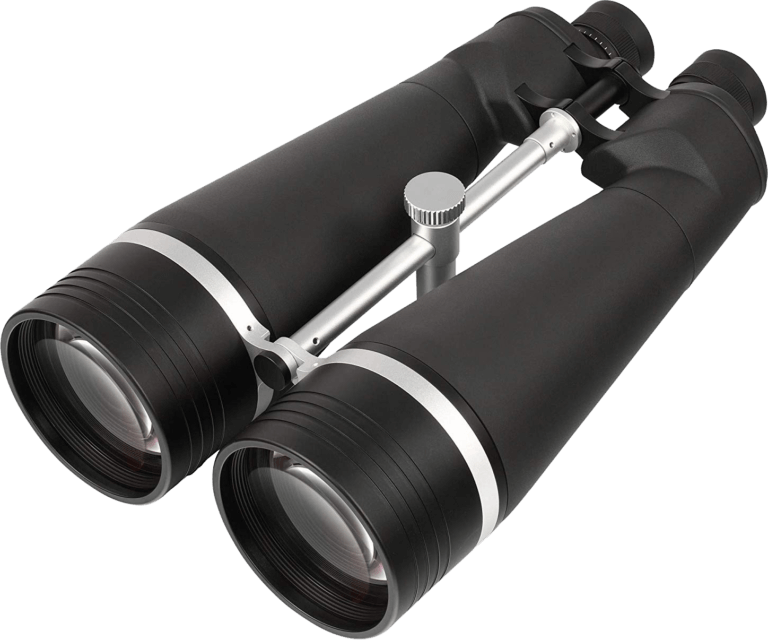
The Omegon Nightstar 25 × 100 binoculars are powerful binoculars dedicated to observing nature and the stars. It is a device that provides bright images ideal for astronomical observation.
With a lens diameter of 100 mm, the optics capture 204 times more light than the eye adapted to darkness (for a pupil of 7 mm). In addition, the 4mm exit pupil provides a clear, contrasting image for observing nature at dusk. The oversized BaK4 prisms provide a wide and bright field of vision. All optical surfaces are completely covered with several layers to guarantee high light transmission. The lenses have an 18mm eye relief for particularly comfortable vision, which means that even spectacle wearers can see the entire field of vision.
The central section reinforced with a metal tripod adapter allows the astronomical binoculars to be optimally mounted and balanced on any standard tripod. The focus is achieved by a dedicated adjustment for each eyepiece, ensuring optimal dioptric compensation. These binoculars are ideally designed for outdoor use, with their special impact-resistant design. The waterproof, nitrogen-filled housing is made of aluminum alloy, so you can continue to enjoy it even after many years of use.
Weighing just 3.35 kg, these astronomical binoculars are among the lightest binoculars in the 100mm range.

